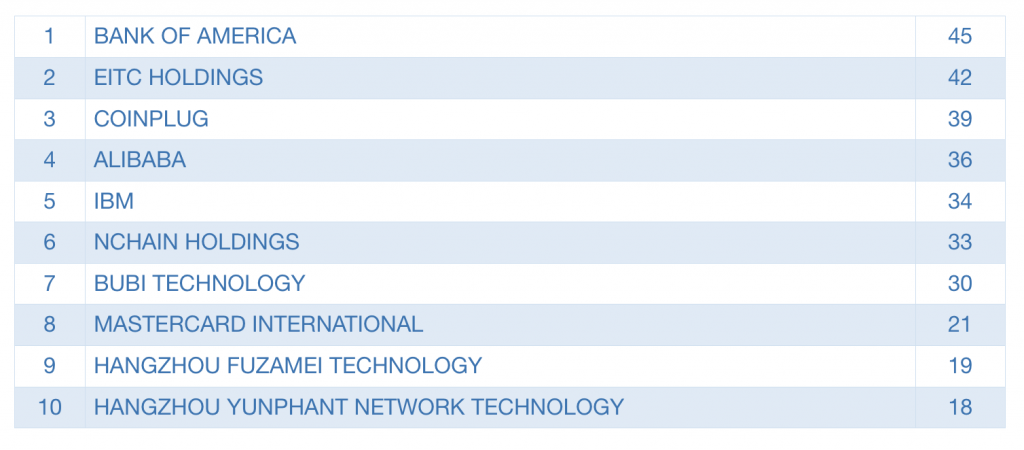Think of cryptocurrency developers and names like Satoshi Nakamoto, Gavin Andresen, and Nick Szabo spring to mind. Individuals who place principles ahead of profit and are more aligned with open source principles than filing patents and closely guarding their secrets. The only secret Satoshi guarded was his identity. It may come as a surprise then to learn that in the last decade, the company that has more cryptocurrency patents than any other is in many bitcoiners’ eyes the antithesis of everything decentralized currency stands for – Bank of America.
Also read: Crypto Exchanges Launch P2P Platforms from Latvia and Bulgaria
Bitcoin Patents Pile Up
Since Bitcoin’s genesis block was mined nine years ago, over 2,000 related patents have been filed, Bitcoin Patent Report reveals. In the cryptocurrency’s early years, the number of patents was low, averaging under 50 a year, but by 2015 that figure began to pick up and by 2016 was growing exponentially. Some of the companies whose names feature in the top ten are to be expected, such as Bitflyer and IBM, whose interest in blockchain is well documented. The computing giant has filed a total of 34 cryptocurrency related patents, but is outplaced by South Korean brokerage Coinplug, which is third on the list with 39.

Some entrants on the list are unexpected, either because they have publicly expressed little interest in cryptocurrency, or are not commonly associated with cutting edge technology. It makes sense that Mastercard would have an interest in digital payment systems, for example, but it is surprising to see them ranked ninth for cryptocurrency related patents, with 21 filings. The greatest surprise of all is reserved for top spot, which is claimed by Bank of America, with no less than 45 patents. Last year, a total of 1,250 cryptocurrency patents were filed, demonstrating the extent to which corporations have finally caught on to bitcoin’s huge potential.
Encouraging Innovation or Stifling Competition?
A patent grants its holder exclusive rights to an invention, such as a piece of technology, for a certain period of time. While designed as a means of protecting the intellectual property of inventors, the system is not without its critics who believe that patenting deters innovation and wastes resources. For example, companies may apply for overly broad patents and then use skilled lawyers to prevent anyone from encroaching on them. Certainly, patents weren’t the first thought of the cypherpunks who sought to make the internet a better and safer place through developing cryptographic tools and later cryptocurrency.

Any individual or organization can file a patent, and just because one is registered and approved doesn’t mean the technology has any merit. In other words, the number of patents an entity files is not evidence of their expertise in the field. Bitcoin’s earliest developers were more interested in creating revolutionary technology than applying to have their code protected by centralized databases. One later entrant to the scene who is synonymous with patents, however, is Craig Wright. He makes it to number two on the list by dint of EITC Holdings, which has filed 42 patents.
Bitcoin Patent Report also reveals that 50% of all crypto-related patents come from China (910) followed by the U.S. (676), U.K. (112), and South Korea (98). Regardless of the merits of each patent, and the moral case for their very existence, they indicate the unprecedented level of interest in bitcoin and the blockchain ecosystem. From insurrectionary cypherpunks to the largest corporations, everyone now has a stake in the game.
How do you feel about companies patenting cryptocurrency technology? Let us know in the comments section below.
Images courtesy of Shutterstock, and Bitcoin Patent Report.
Need to calculate your bitcoin holdings? Check our tools section.
The post Bank of America Has Filed More Cryptocurrency Patents Than Any Other Company appeared first on Bitcoin News.














